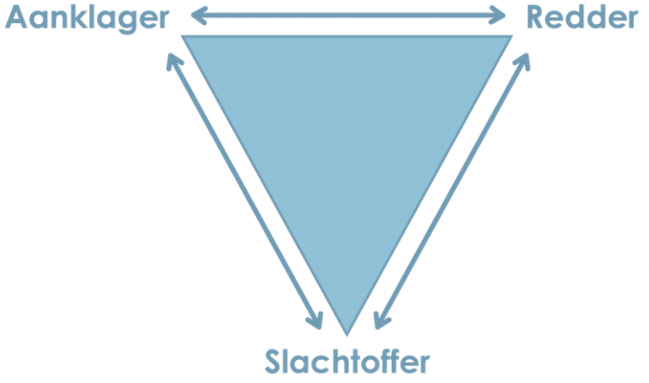Process and organisational changes are crucial for efficiency, growth, innovation and customer satisfaction. New technologies are implemented, workflows are revised and roles within teams shift. While these changes are aimed at improvement, they can often lead to uncertainty and resistance in the workplace. Team members can feel overwhelmed and this can affect their ability to work together constructively. Research also shows that between 60% and 80% of change initiatives are delayed or fail, often due to employee resistance.
A useful model for understanding these underlying dynamics is the Drama Triangle. This model offers insight into the roles people unconsciously adopt under pressure, and shows how these roles can negatively affect a team during a change.
What is the drama triangle?

The Drama Triangle describes three common roles people assume when they find themselves in a stressful situation:
- The Saviour - This team member feels responsible for others, often takes on too much and tries to solve others' problems even when not asked.
- The Victim - This team member sees himself as powerless and looks for support or rescue, without actively wanting to change the situation himself.
- The Prosecutor - This team member blames others for problems and criticises without contributing constructively to a solution.
The drama triangle, cooperation and resistance
When team members fall into these roles, cooperation and effectiveness are often disrupted. The focus shifts from joint problem-solving to emotional and sometimes destructive interactions. For example, a team member who ends up in the role of victim may show passive resistance by withdrawing and not actively participating in the change process because he or she does not see the change working. Instead of asking for help or contributing to a solution, this attitude blocks the team's progress. This puts pressure on both the change process and the relationships between them, which only further increases resistance to the change.
The Drama Triangle traps individuals in a pattern of reactive behaviour, reinforcing each other's behaviour and avoiding their own responsibility for constructive action. Without awareness of this dynamic, a team can continue to struggle, even with the best intentions of everyone involved. An effective way to break this destructive cycle is to switch to the "Winner's Triangle".
From Drama Triangle to Winners' Triangle
The Winners' Triangle offers a positive and constructive alternative to the Drama Triangle. Instead of reactive roles, team members consciously choose behaviours that foster cooperation and encourage personal responsibility:
- The Supporting (instead of Saviour) - This person offers support, but does not take over the other person's responsibility. He or she encourages the other person to take steps on his or her own.
- The Vulnerable (rather than the Victim) - Instead of being powerless, this person dares to ask for help and acknowledges his or her own responsibility in the process.
- The Assertive (rather than the Prosecutor) - Instead of criticising, this person clearly and respectfully expresses what he or she needs and thinks about solutions.
In the Winners' Triangle, team members take responsibility for their own behaviour and work together to find constructive solutions, without overcharging or blaming others. This improves cooperation and increases the likelihood of successful change.
The transition from the Drama Triangle to the Winner's Triangle starts with awareness. Teams must first recognise their tendency to step into old roles. This awareness can only come about by having open conversations about behavioural patterns and how they affect the team. Different working forms and methodologies can support this process. Once these dynamics become discussable, teams can begin to break negative patterns and develop a culture of responsibility and cooperation. Here, the shift to the roles of the Winners' Triangle contributes to sustainable behavioural change.
Conclusion
Process change is a necessary part of organisational optimisation, but it can have a significant impact on team collaboration. The Drama Triangle helps to understand how stress and uncertainty create gender roles that hinder cooperation and the change process. By recognising these dynamics and consciously choosing constructive roles from the Winners' Triangle, teams can work together more effectively and implement change more successfully.
Want more practical insights and tips on successful process and organisational change? Follow IMPROVEN on LinkedIn via our channel 'The Taste of Perfection' for articles and real-life experiences that will help you further in your change processes.






















